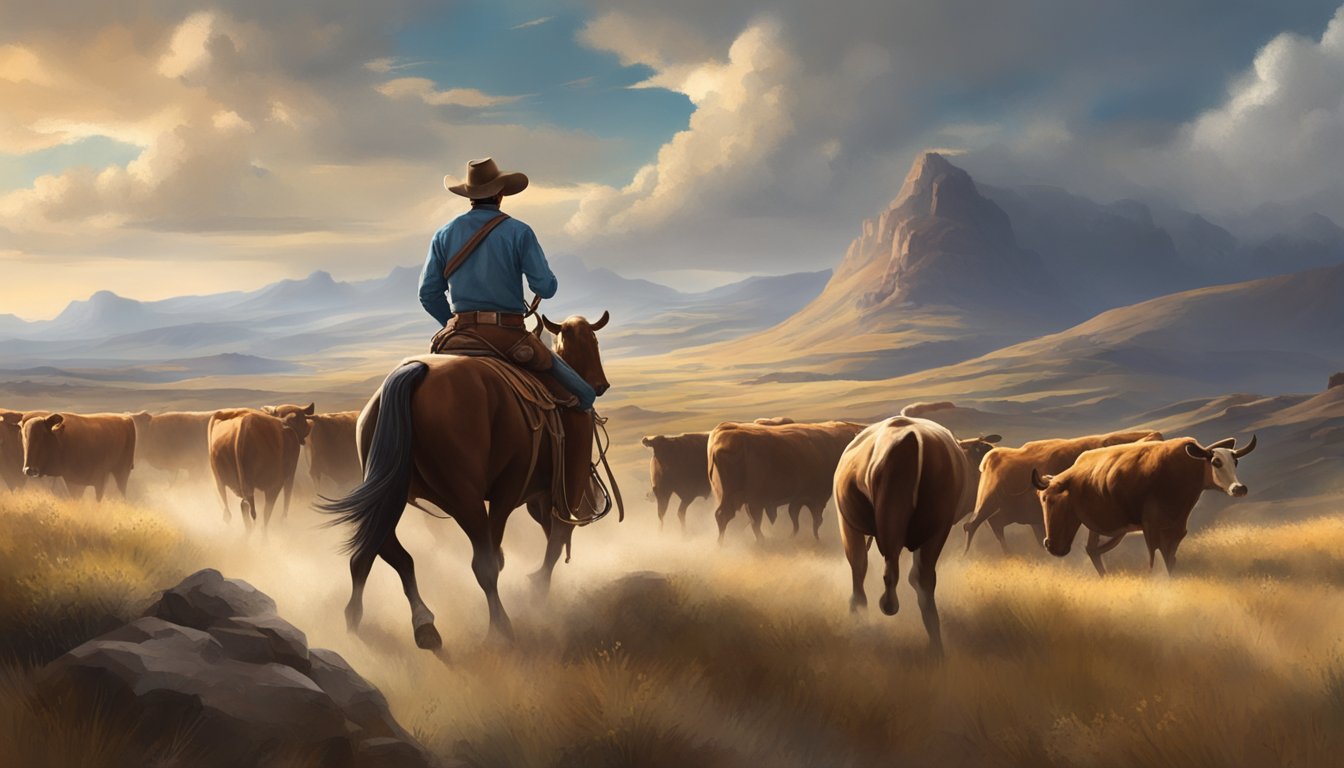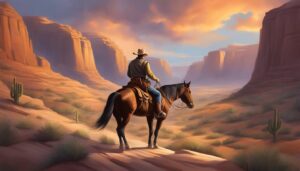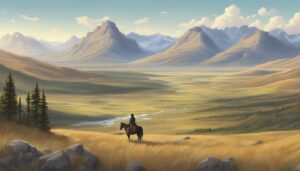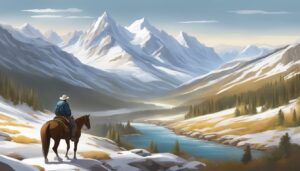Western heroes have long captivated audiences with their rugged individualism and unwavering moral codes. Two iconic figures that exemplify this archetype are John Dutton from the TV series “Yellowstone” and Hondo Lane from the classic film “Hondo.” Both characters embody the spirit of the American West, but in distinctly different ways.
John Dutton, portrayed by Kevin Costner, is a modern-day rancher fighting to protect his family’s legacy and vast Montana estate. His character combines traditional Western values with a shrewd understanding of contemporary politics and business. While John Dutton’s methods are often ruthless, his dedication to preserving his land and way of life makes him a compelling anti-hero for the 21st century.
Hondo Lane, played by John Wayne in the 1953 film, represents a more classic Western hero. A rugged individualist with a strong moral compass, Hondo navigates the dangerous frontier with skill and honor. His character embodies the romanticized ideals of the Old West, including self-reliance, courage, and a clear sense of right and wrong.
Character Profiles

John Dutton and Hondo Lane represent iconic Western heroes, each shaped by their unique circumstances and values. These characters embody the rugged individualism and moral complexity often found in Western narratives.
John Dutton: Patriarch of Yellowstone
John Dutton, portrayed by Kevin Costner, is the powerful owner of the largest contiguous ranch in the United States. As the patriarch of the Dutton family, he fiercely protects his land and legacy.
John’s character is defined by his unwavering determination and sometimes ruthless tactics. He navigates complex political and business landscapes to preserve his way of life.
Despite his flaws, John possesses a strong sense of duty to his family and the ranch. His charisma and leadership skills make him a formidable force in the modern West.
Hondo Lane: A Western Hero
Hondo Lane, originally created by Louis L’Amour, is a quintessential cowboy of the Old West. He embodies the classic Western hero archetype with his strong moral code and rugged independence.
Hondo’s character is marked by his skills as a scout and his ability to bridge the gap between settlers and Native Americans. He represents a man of few words but decisive action.
Unlike John Dutton, Hondo operates in a more traditional Western setting. His conflicts often revolve around frontier justice and personal honor rather than modern corporate battles.
Hondo’s interactions with both settlers and Native Americans showcase his adaptability and respect for different cultures, adding depth to his character.
Key Themes and Motifs

Both John Dutton and Hondo Lane grapple with complex themes of family, loyalty, power, and morality in their respective Western settings. These elements shape their characters and drive the conflicts they face.
Family and Loyalty
John Dutton’s life revolves around protecting the Yellowstone ranch and his family legacy. He views the land as an extension of the Dutton name, fiercely defending it against external threats. This dedication often puts him at odds with his children, particularly Jamie and Beth.
Hondo Lane, while not tied to land, forms a makeshift family with Angie Lowe and her son. His loyalty to them drives much of his actions throughout the story. Both characters demonstrate unwavering commitment to their chosen families.
The Dutton family dynamics are marked by intense rivalries and power struggles. John’s relationships with his children are complex, filled with both love and conflict.
Conflict and Power Struggles
John Dutton faces constant challenges to his authority and land ownership. He uses political connections, intimidation, and sometimes violence to maintain control. His position as Montana governor in later seasons further amplifies these power dynamics.
Hondo’s conflicts stem from his position between two worlds – the Apache and the settlers. He must navigate complex tribal politics and the encroachment of white settlers on Native lands.
Both characters engage in moral compromises to achieve their goals. John’s tactics often skirt the law, while Hondo balances his respect for Apache culture with his duties as a scout.
Morality and Justice
John Dutton’s moral code is rooted in preserving his family’s legacy, often at the expense of others. He justifies questionable actions as necessary for protecting the ranch and his way of life.
Hondo Lane adheres to a personal code of honor, influenced by both his settler background and Apache teachings. He seeks justice on his own terms, sometimes operating outside the law.
Both characters blur the lines between right and wrong, presenting complex portrayals of morality in the American West. Their actions challenge viewers to consider the price of survival and loyalty in harsh frontier environments.
Setting and Sociocultural Context

The settings of Yellowstone and Hondo shape their characters and narratives profoundly. Both works explore complex relationships between settlers, ranchers, and indigenous peoples against distinct Western backdrops.
Representation of Montana and the West
Yellowstone showcases Montana’s breathtaking landscapes and rugged terrain. The fictional Yellowstone Ranch serves as a microcosm of the American West, embodying its beauty and challenges. The show portrays the state’s ranching culture, depicting vast cattle operations and the struggles to maintain them in the face of modernization.
The Dutton Ranch stands as a symbol of the traditional Western way of life, constantly under threat from developers, tourists, and changing times. This setting allows for exploration of contemporary issues like land use conflicts, economic pressures on ranchers, and environmental concerns.
Depiction of Indigenous Peoples and Land Rights
Yellowstone incorporates the fictional Broken Rock Indian Reservation into its narrative, highlighting ongoing tensions between Native Americans and white settlers. The show addresses land rights disputes, showcasing the complex legal and historical issues surrounding tribal sovereignty.
Indigenous characters like Thomas Rainwater provide nuanced perspectives on these conflicts. The series explores the impact of past injustices on present-day relationships between different communities in Montana.
Hondo, set in 1870s Arizona Territory, offers a different historical context for indigenous relations. It portrays interactions between settlers and Apache tribes during a period of active conflict, providing a contrasting view of these dynamics from an earlier era.
Narrative and Storytelling

John Dutton and Hondo Lane exist in distinct narrative frameworks that shape their characters and storylines. Their tales employ different approaches to family dynamics, individual arcs, and temporal structures.
Role of Family and Individual Story Arcs
John Dutton’s story in Yellowstone revolves around his family legacy and the ranch. His character development intertwines with his children’s journeys, creating a complex web of relationships. Beth, Kayce, and Jamie each have pivotal arcs that both support and challenge John’s goals.
Taylor Sheridan’s writing explores how family loyalty conflicts with personal ambitions. This dynamic is particularly evident in seasons 4 and 5, where the Duttons face external threats and internal strife.
Hondo Lane’s narrative, in contrast, focuses more on his individual journey. While family plays a role, it’s not the central driving force of his story.
Use of Flashbacks and Non-linear Narratives
Yellowstone employs flashbacks to enrich John Dutton’s backstory and the ranch’s history. These non-linear elements provide context for present-day conflicts and decisions. Viewers gain insights into John’s past, including his relationship with his father and late wife.
The TV show’s structure allows for multiple timelines, enhancing character depth. This technique is particularly effective in revealing the origins of long-standing feuds and alliances.
Hondo’s story follows a more linear path. The narrative focuses on his present actions and decisions, with less emphasis on past events shaping his character.
The Creative Force

Taylor Sheridan‘s vision for Yellowstone and its expansive universe has captivated audiences. The show’s production and broadcast history reflect its growing popularity and ambitious scope.
Taylor Sheridan’s Vision
Taylor Sheridan created Yellowstone with a clear vision of exploring modern Western themes. He drew inspiration from his upbringing in rural Texas to craft authentic characters and storylines. Sheridan’s writing emphasizes complex family dynamics, land disputes, and the clash between tradition and progress.
His attention to detail extends to the show’s visual style, capturing Montana’s rugged beauty. Sheridan also takes a hands-on approach, often directing key episodes himself. This creative control has allowed him to maintain consistency in the show’s tone and themes across multiple seasons.
Production and Broadcast History
Yellowstone premiered on the Paramount Network in June 2018. The show quickly gained a devoted following, with viewership growing each season. Its success led to an expanded universe, including prequels like 1883 and 1923.
Production takes place primarily in Montana and Utah, lending authenticity to the setting. The show’s high production values and star-studded cast, led by Kevin Costner, contribute to its cinematic quality. Paramount+ has become integral to the show’s distribution, offering streaming access to new and past episodes.
Yellowstone’s popularity has sparked renewed interest in Western-themed content across the entertainment industry. The show’s impact extends beyond television, influencing fashion trends and boosting tourism in filming locations.
The Impact on Modern Westerns

John Dutton and Hondo Lane have left indelible marks on the Western genre, shaping its evolution and appeal to contemporary audiences. Their characters have sparked renewed interest in cowboy culture and influenced popular media portrayals of the American West.
Cultural Resurgence of the Cowboy
Kevin Costner’s John Dutton in “Yellowstone” has reignited fascination with modern ranch life. The show presents a gritty, realistic depiction of cowboy culture in the 21st century. It explores challenges like land disputes, corporate encroachment, and family legacies.
Dutton’s character bridges traditional Western values with current issues. This approach has attracted new viewers to the genre, especially younger demographics. “Yellowstone” showcases the enduring appeal of cowboy life while addressing contemporary themes.
In contrast, Hondo Lane represents a more classic Western hero. His character in the 1953 film “Hondo” embodies traditional cowboy virtues like honor and self-reliance. These qualities continue to resonate with audiences, even in modern retellings.
Influence on Popular Culture
“Yellowstone” has significantly impacted popular culture, sparking trends in fashion, tourism, and entertainment. The show’s success has led to a surge in Western-themed content across various media platforms.
Viewers have embraced cowboy fashion, with increased sales of Western wear and accessories. Tourism to ranch locations has grown, with fans seeking authentic Western experiences.
The series has also inspired spin-offs and similar shows, expanding the Western genre’s presence on television. This renewed interest has led to more diverse storytelling within the Western framework.
Hondo Lane’s influence is more subtle but equally important. The character’s portrayal by John Wayne set a standard for Western heroes that continues to inspire modern interpretations. Many contemporary Western protagonists draw elements from Hondo’s stoic yet compassionate persona.
Reception and Criticism

John Dutton and Hondo Lane have garnered significant attention from audiences and critics alike. Their portrayals have sparked discussions about authenticity in Western characters and the evolution of the genre.
Public Response and Ratings
“Yellowstone” became a hit for Paramount Network, with John Dutton emerging as a fan-favorite character. Viewers praised Kevin Costner’s nuanced performance, bringing depth to the complex rancher-turned-politician. The show’s ratings soared, attracting millions of viewers each episode.
Hondo Lane, portrayed by John Wayne in the 1953 film, gained a dedicated following. Audiences appreciated the character’s rugged individualism and moral code. The film’s success led to a short-lived TV series, indicating Hondo’s enduring appeal.
Analysis of Critical Reviews
Critics have analyzed both characters extensively. John Dutton received praise for his multifaceted nature, balancing ruthlessness with family loyalty. Some reviewers noted the character’s relevance to modern discussions of land use and political power.
Hondo Lane garnered positive reviews for his portrayal of a classic Western hero. Critics appreciated the character’s complexity, particularly his relationship with Native Americans. However, some modern analyses point out dated elements in the original portrayal.
Both characters faced scrutiny regarding their authenticity as Western figures. Critics debated whether John Dutton represents a realistic modern rancher or a romanticized version. Hondo Lane’s depiction sparked discussions about historical accuracy in Western films.
Character Dynamics and Relationships

The Yellowstone universe revolves around complex family ties and strategic alliances. At the center lies the Dutton family, whose intricate relationships shape the series’ narrative. Their interactions with allies and adversaries create a web of loyalties and conflicts that drive the story forward.
The Dutton Family Tree
John Dutton stands as the patriarch of the Dutton clan, overseeing his children Kayce, Beth, and Jamie. Each sibling brings a unique dynamic to the family. Kayce, the youngest, struggles between his loyalty to the ranch and his own family. Beth, fiercely protective of her father, often clashes with Jamie, the adopted son whose ambitions sometimes conflict with family interests.
Rip Wheeler, though not related by blood, has become an integral part of the Dutton family. His unwavering devotion to John and romance with Beth add depth to the family dynamics.
Allies and Adversaries
The Duttons’ circle extends beyond family, encompassing both supporters and opponents. Chief Thomas Rainwater emerges as a formidable adversary, challenging the Duttons’ claim to the land. His strategic moves often put him at odds with John’s interests.
Sarah Atwood enters the fray as a cunning opponent, using her intelligence to navigate the complex world of Montana politics and business. Her presence adds a new layer of tension to existing relationships.
The ranch hands form a tight-knit group loyal to the Duttons, acting as an extended family. Their dedication to protecting the ranch often puts them in dangerous situations, testing their loyalty.
Conclusion

John Dutton and Hondo Lane stand as iconic Western heroes, each leaving an indelible mark on the genre. Dutton’s complex modern struggles and shrewd tactics contrast with Hondo’s straightforward frontier justice and rugged individualism.
Both characters embody the spirit of the West in their own unique ways. Dutton’s power lies in his strategic thinking and ability to navigate contemporary challenges. Hondo’s strength comes from his raw survival skills and adherence to a simple moral code.
Their differing approaches to conflict resolution and leadership reflect the evolution of Western storytelling. Dutton’s battles play out in boardrooms and political arenas, while Hondo’s unfold on the open range.
Ultimately, determining which hero is more impressive depends on individual viewer preferences. Some may favor Dutton’s nuanced portrayal of power dynamics in the modern West. Others might appreciate Hondo’s classic embodiment of frontier values and self-reliance.
Both characters contribute significantly to the Western genre, showcasing its enduring appeal and adaptability across different eras of storytelling.



